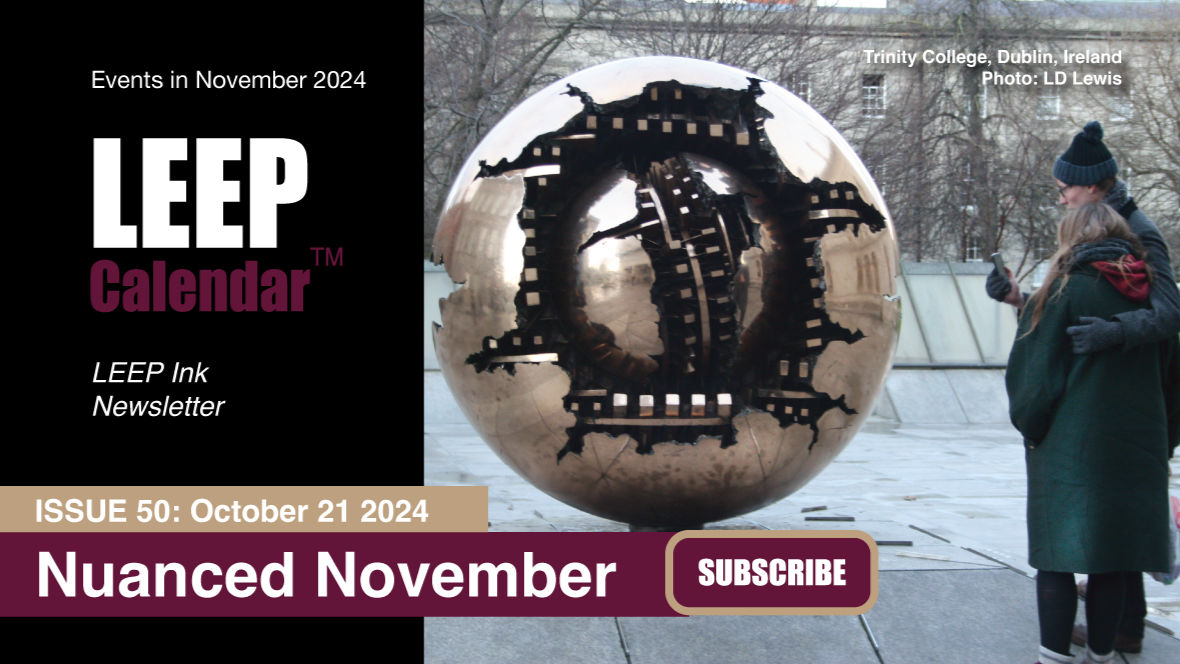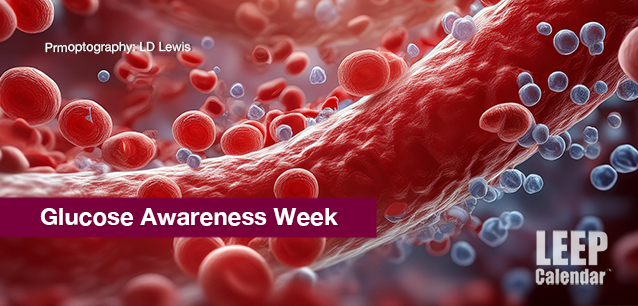 AD
AD
Today is: December 29
Scroll to explore events active on this date.
Additional Events on LEEP
LEEP INK FEATURES

2025 is the Year of...
21 Themes and 'Year of' Events for 2025 PART ONE, THE FIRST 12 Every year, various organizations announce the theme for the year. These themes can focus on causes, such as aesthetics and color tre...

Nuanced November 2024
November is the start of the holiday season in many parts of the world. It is a time for family, football, food, shopping and decorating, particularly in the Christian and Jewish world, leading to Christmas and...

December's Gift
Events in December 2024. Well, we made it to December. December is the holiday season, particularly in Western nations, where Christianity and Judaism are the faiths most common in the nation's past. ...
About National Glucose Week
Sports & Fitness , Food
United States
Ends: Sep 28, 2025
DESCRIPTION:
A WEEK TO FOCUS ON GLUCOSE:
GLUCOSE AWARENESS WEEK
Glucose Awareness Week is typically organized by health and diabetes organizations, such as the American Diabetes Association, to promote understanding of glucose levels and their impact on overall health. The week focuses on raising awareness about managing blood glucose, particularly for people with diabetes or those at risk.
The event emphasizes the significance of glucose management in maintaining a healthy lifestyle. It covers topics like how the body processes glucose, the role of insulin, the dangers of high or low glucose levels (hyperglycemia and hypoglycemia), and ways to maintain balanced blood sugar through diet, exercise, and medications.
Participation in Glucose Awareness Week can include:
—Health screenings: Many clinics or community health centers offer free blood glucose testing.
—Educational workshops:
These workshops inform people about managing glucose levels and preventing complications like diabetes.
—Online campaigns:
Social media campaigns may offer tips, success stories, and resources.
—Fundraising events:
Charitable events, such as walks or runs, raise money for diabetes research and education.
Why is glucose essential?
Glucose is a vital source of energy for the body's cells. It comes from the carbohydrates we eat, and insulin, produced by the pancreas, helps move glucose from the bloodstream into the cells for energy.
What happens if you have too much or too little glucose?
—Too much glucose (hyperglycemia):
High blood sugar can lead to serious complications over time, such as heart disease, kidney damage, nerve damage, and vision problems. It is commonly associated with diabetes.
—Too little glucose (hypoglycemia):
Low blood sugar can cause dizziness, confusion, sweating, shaking, and fainting. Severe hypoglycemia can lead to unconsciousness or seizures if not treated promptly.
Managing glucose levels is essential to avoid these extremes and maintain good health.
WHAT IS GLUCOSE?
Glucose is a type of sugar that is the primary energy source for the body's cells. It comes from carbohydrates in foods like bread, rice, fruits, and sweets. Once glucose enters the bloodstream, it requires insulin, a hormone produced by the pancreas, to help cells absorb and use it for energy. Glucose and insulin balance is vital for maintaining stable energy levels and overall health.
How Does Glucose Impact Diabetes?
The body's ability to regulate glucose remains impaired with diabetes:
—Type 1 diabetes:
The pancreas produces little to no insulin, so glucose cannot enter the cells, causing high blood sugar levels.
—Type 2 diabetes:
The body either becomes resistant to insulin or doesn't produce enough, leading to elevated blood glucose levels over time.
Gestational diabetes:
Gestational diabetes occurs during pregnancy when the body cannot effectively use insulin, resulting in higher glucose levels.
If glucose levels remain high for extended periods, it can damage organs, nerves, and blood vessels, increasing the risk of heart disease, kidney failure, vision problems, and other complications.
GLUCOSE AND DIABETES
Glucose was first isolated in 1747 by German chemist Andreas Marggraf, who identified it in raisins. Later, in 1811, the French chemist Jean Baptiste Dumas identified glucose as a primary product of carbohydrate breakdown, leading to a deeper understanding of its role in human metabolism.
TOP FIVE WARNING SIGNS OF DIABETES
—Frequent urination:
High blood sugar levels cause the kidneys to work overtime, leading to more urination.
—Excessive thirst:
As the body loses fluids through increased urination, dehydration sets in, causing persistent thirst.
—Unexplained weight loss:
Despite eating more, people with diabetes may lose weight because the body can't use glucose effectively.
—Fatigue:
Lack of energy due to the body's inability to convert glucose into energy can cause persistent tiredness.
—Blurred vision:
High glucose levels can affect the eyes' lenses, leading to temporary vision problems.
These symptoms are key indicators and should prompt immediate medical consultation if noticed.
CAN PEOPLE RECOVER FROM DIABETES?
Diabetes, particularly Type 2 diabetes, can often be managed and, in some cases, reversed with lifestyle changes, but full recovery (complete elimination of the disease) is generally not possible, especially for Type 1 diabetes. Here's how it works:
Type 1 Diabetes:
—Recovery:
There is currently no cure for Type 1 diabetes. It is an autoimmune condition where the body attacks insulin-producing cells in the pancreas. People with Type 1 diabetes need lifelong insulin therapy to manage their glucose levels.
—Management:
Individuals can manage Type 1 diabetes through insulin injections, a controlled diet, and regular exercise to maintain stable blood sugar levels.
Type 2 Diabetes:
—Reversal/Remission:
In some cases, people with Type 2 diabetes can achieve remission, meaning their blood sugar levels return to a healthy range without the need for medication. Remission or reversal is usually accomplished through significant lifestyle changes, such as:
—Diet:
A healthy, low-calorie, low-carb diet focusing on whole foods (vegetables, lean proteins, and whole grains) can significantly reduce blood sugar levels.
—Weight loss:
Losing excess weight, especially around the abdomen, can improve insulin sensitivity and help the body regulate blood sugar more effectively.
—Exercise:
Regular physical activity (such as walking, swimming, or strength training) helps lower blood sugar levels and boosts the body's response to insulin.
—Medication:
Medications that reduce insulin resistance or stimulate insulin production may be required temporarily.
—Long-Term Management:
Even if remission is achieved, ongoing lifestyle modifications are needed to maintain it, as diabetes can return if old habits resume.
Gestational Diabetes:
—Recovery:
This form of diabetes usually goes away after childbirth. However, women who have had gestational diabetes are at higher risk of developing Type 2 diabetes later in life, so adopting healthy lifestyle practices is essential.
PREVENTION AND EARLY INTERVENTION
For individuals at risk of developing Type 2 diabetes (e.g., prediabetes), early intervention with lifestyle changes can prevent the progression to full-blown diabetes.
While there is no complete "cure" for diabetes, especially for Type 1, many people can live healthy, normal lives by managing the disease effectively. In the case of Type 2, some people can achieve remission through sustained lifestyle changes.
VIDEOS
SUPPORTING DOCUMENTS
ADDITIONAL IMAGES
Currently, this event does not have supporting images.
Where would you like to go now?
 AD
AD



/footer-logo.svg)
